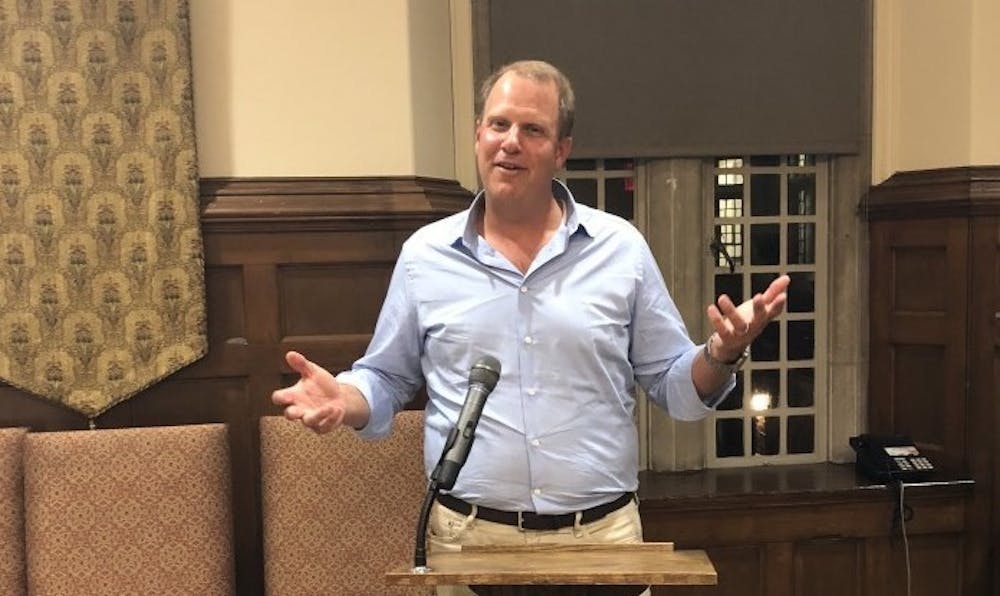When people think about college campuses, one thing that usually comes to mind is the party scene. Whether one saw it in a movie, heard stories about it or lived it first-hand, the drug and alcohol culture is prevalent on college campuses.
University of Richmond alumnus Andrew J. “Drew” Rothermel, '91, gave a talk on Tuesday, Oct. 23, at UR. It was the first talk hosted by the Student Health Center, Counseling and Psychological Services and Health Promotions as a collaborative effort. The offices are also working together on events such as Ocsoberfest and Pleasurefest, Health Promotion and Peer Education staff member Slade Gormus said.
Rothermel has served as chief executive officer for several behavioral and addiction treatment centers in Pennsylvania, New Jersey and Florida.
Rothermel came back to campus after Bill Maher, a local interventionist, contacted Gormus about Rothermel wanting an opportunity to speak with UR students about his recovery, Gormus said.
During Rothermel’s second year at UR, he overdosed on cocaine at an off-campus party. Rothermel was dropped off at St. Mary’s Hospital and was treated like a street-drug-addict until the doctors found out who his parents were, Rothermel said.
This incident led to Rothermel spending two weeks in St. Mary’s intensive care unit and ultimately was what made him realize he had a substance abuse problem, he said.
After his overdose, Rothermel went home to Pennsylvania and took the rest of the semester off to recover and complete a 12-step program, he said.
When he got back to school, he struggled to find a support system on campus but spent a lot of time with other members of the 12-step program in Richmond, Rothermel said.
One of the problems the CAPS staff members are tackling is what they can do to create and change the support system that was not offered when Rothermel was a student 30 years ago, Rothermel said.
After Rothermel spent eight years practicing law, he got involved in treatment and recovery facilities, he said. He had volunteered at treatment centers before and saw that he loved it. Now, he has been working at and helping run treatment centers for 15 years.
One of Rothermel’s treatment centers focuses on treating high school and college-age students. The center is located at Florida Atlantic University’s campus with the goal of ensuring that the students in the program do not lose their spot in their school and to minimize academic wreckage, Rothermel said.
Gormus asked Rothermel what he thought UR could be doing to help students on campus who may be struggling with substance-abuse problems or who have a family member or friend who is.
Enjoy what you're reading?
Signup for our newsletter
Rothermel said he encouraged students to use the campus counseling and support systems offered and to find a school or program that offered collegiate recovery programs. Rothermel also suggested finding activities that didn’t involve drinking.
After Rothermel was sober, he spent less time socializing on campus and more time with people in his program, he said. He was able to maintain friendships with people he had met in his first year at UR as well.
“If I felt that students were being judgmental about me not drinking, I learned that it was just me," Rothermel said. "No one notices if you are not drinking."
Rothermel began to avoid parties because they became boring for him. He focused on creating friendships in his classes and with people he met around campus, he said.
The stigma surrounding alcohol and drug abuse continues to grow on college campuses, but if something is not done to intervene with people who are having problems, it can have deadly consequences, Rothermel said.
“I encourage you to find your voice, or find a professional to help you reach out to someone if you can’t find your voice, and get people who need help the help they need,” Maher said.
If students suspect that there is something wrong with their friends, or that they could be abusing drugs or alcohol, it is imperative to express concern in a non-judgmental way and help them find the resources they need, Rothermel said.
The stigma is what kills people because they don’t want to talk about it, but we don’t want to be too late and regret not having talked about it, Maher said.
Gormus ended the talk by asking the students in the audience what they thought could be implemented on campus to help create a safer environment.
Senior Anna Lowenthal gave the idea of creating an event that would explain what resources are offered on campus and how you could get help or help your friends. The event would be followed by creating support-group meetings in safe spaces that students could attend as they wished, Lowenthal said.
Members of university administration speaking with parents about drugs and alcohol before the students get to campus is also an important part of starting the conversation, Rothermel said. Schools can work with parents to create honest and transparent conversations about drugs and alcohol between the parents and students before they even arrive on campus, he said.
Members of Student Health, CAPS and Health Promotion are hoping that talks such as this one open up the dialogue about substance abuse and recovery, they said.
“Not everyone on this campus drinks, and helping people find safe spaces and fun things to do is important," Gormus said. "We also want to give people who may be in recovery or who need recovery a place that they feel comfortable and accepted."
Contact contributor Julia Muro at julia.muro@richmond.edu.
Support independent student media
You can make a tax-deductible donation by clicking the button below, which takes you to our secure PayPal account. The page is set up to receive contributions in whatever amount you designate. We look forward to using the money we raise to further our mission of providing honest and accurate information to students, faculty, staff, alumni and others in the general public.
Donate Now



